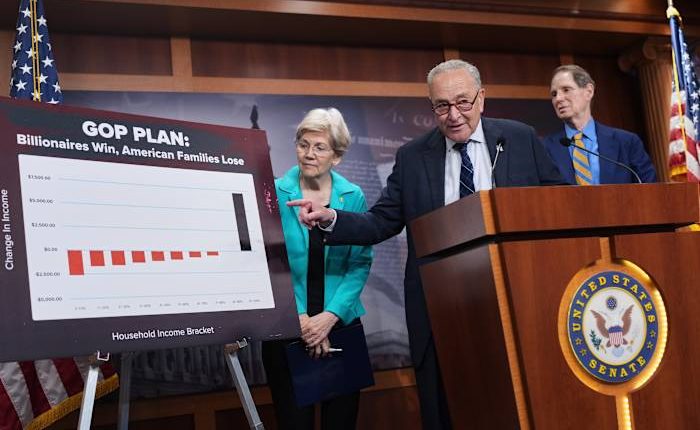Share this @internewscast.com

WASHINGTON – Republicans have encountered an obstacle in their attempt to discourage nonprofits, individuals, and other entities from filing lawsuits to obstruct President Donald Trump’s executive actions.
With Trump facing litigation across the nation, GOP legislators aimed to prevent federal courts from granting temporary restraining orders or preliminary injunctions against the federal government unless plaintiffs provide what could often be a substantial financial bond at the onset of the case.
This proposal was incorporated into the Senate iteration of Trump’s extensive tax and immigration bill, yet faced challenges with the Senate parliamentarian, who determined it breaches the chamber’s rules. Consequently, it is now unlikely to be included in the final legislation.
Federal judges can already require plaintiffs to post security bonds, but such funds are commonly waived in public interest cases. The GOP proposal would make the payment of the financial bond a requirement before a judge could make a ruling, which critics said would have a chilling effect on potential litigants who wouldn’t have the resources to comply.
Senate Democratic leader Chuck Schumer hailed the parliamentarian’s ruling in a press statement and called the GOP effort “nothing short of an assault on the system of checks and balances that has anchored the nation since it’s founding.”
“But Senate Democrats stopped them cold,” Schumer said.
Lawmakers are running scores of provisions by the Senate parliamentarian’s office to ensure they fit with the chamber’s rules for inclusion in a reconciliation bill. The recommendations from Elizabeth MacDonough will have a major impact on the final version of the legislation.
On Friday, she determined that a proposal to shift some food stamps costs from the federal government to states would violate the chamber’s rules. But some of the most difficult questions are still to come as Republicans hope to get a bill passed and on Trump’s desk to be signed into law before July 4th.
Republicans could still seek to include the judiciary provision in the bill, but it would likely be challenged and subject to a separate vote in which the provision would need 60 votes to remain. The parliamentarian’s advice, while not binding, is generally followed by the Senate.
Republicans and the White House have been highly critical of some of the court rulings blocking various Trump orders on immigration, education and voting. The courts have agreed to block the president in a number of cases, and the administration is seeking appeals as well.
In April, the House voted to limit the scope of injunctive relief ordered by a district judge to those parties before the court, rather than applying the relief nationally. But that bill is unlikely to advance in the Senate since it would need 60 votes to advance. That’s left Republicans looking for other avenues to blunt the court orders.
“We are experiencing a constitutional crisis, a judicial coup d’etat,” Rep. Bob Onder, R-Mo., said during the House debate.
Copyright 2025 The Associated Press. All rights reserved. This material may not be published, broadcast, rewritten or redistributed without permission.










